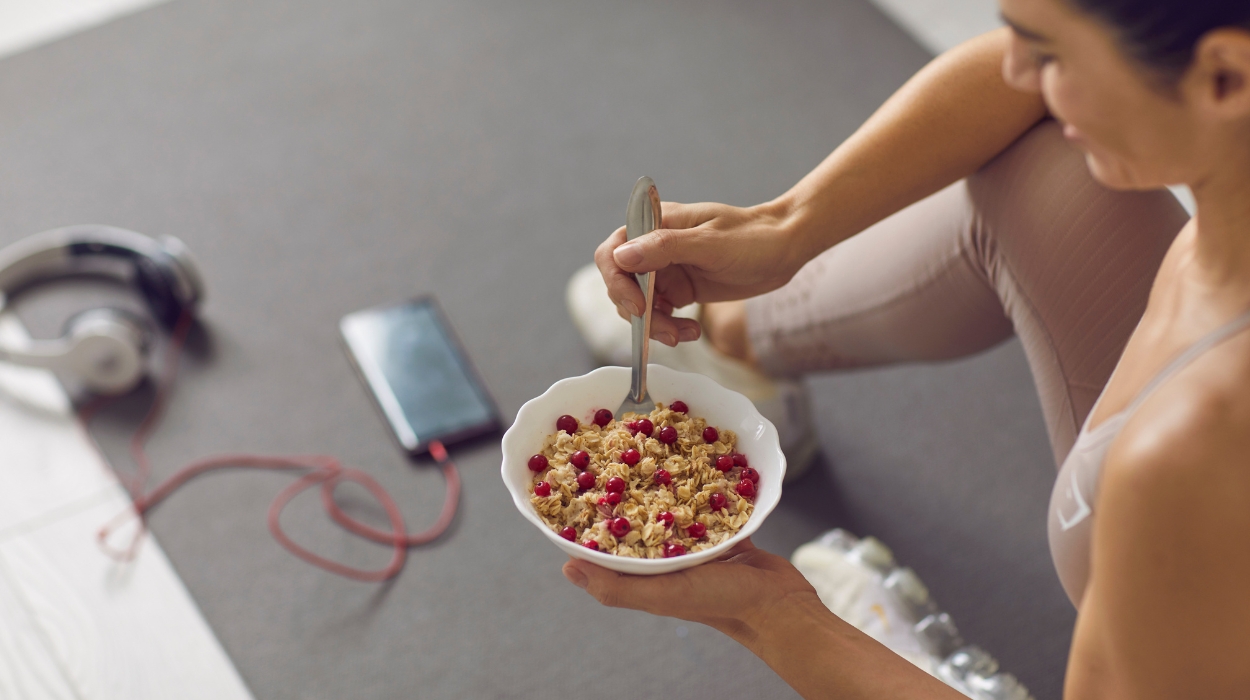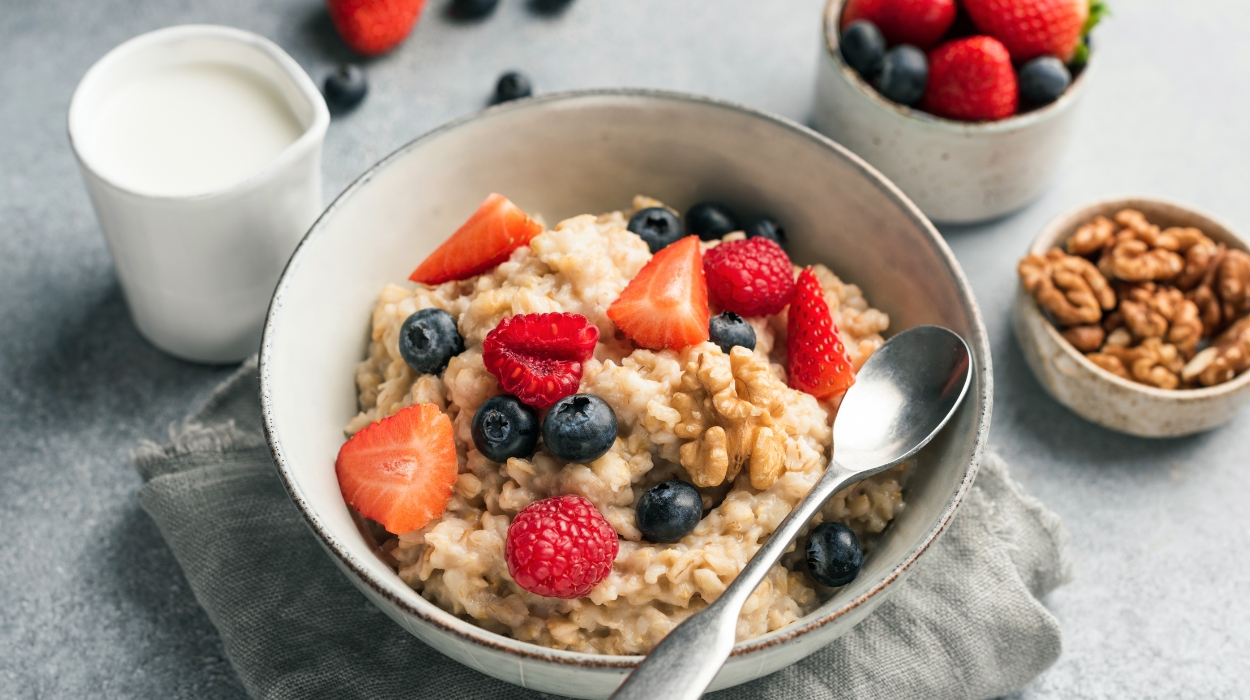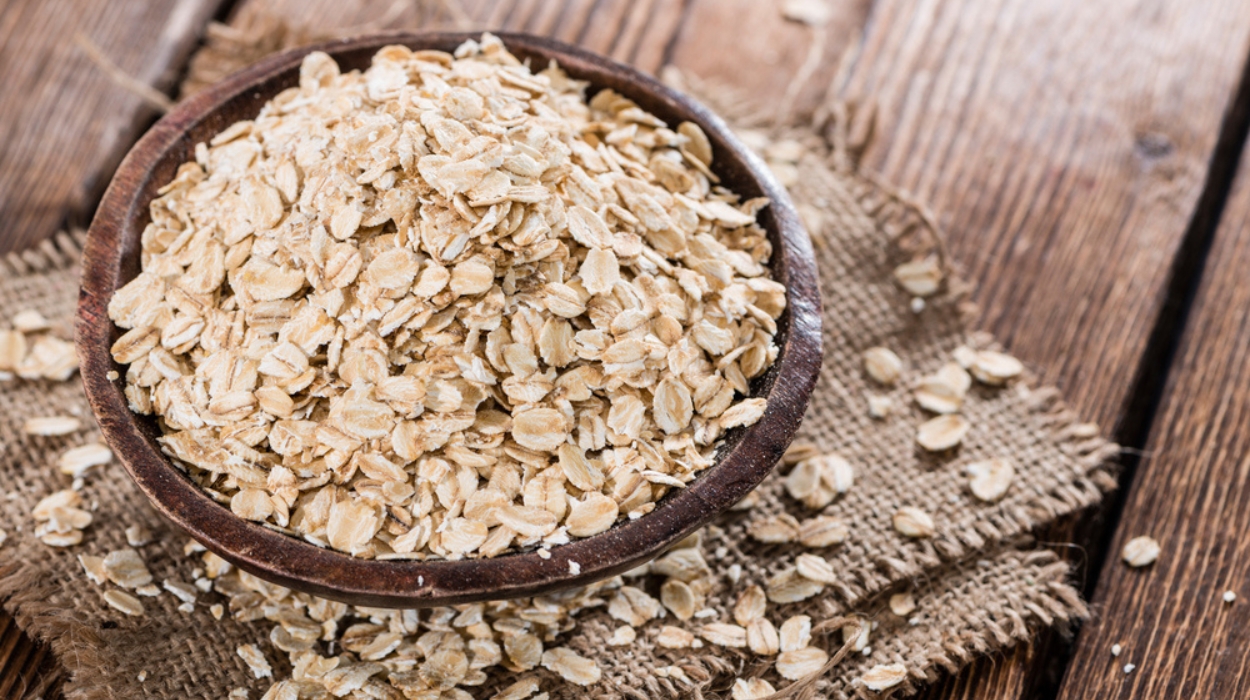Planning and implementing a healthy diet is a must when your goal is to lose weight.
Certain foods should be avoided when considering weight loss. These foods could derail your efforts to attain your goal. Low-quality, nutrient-poor foods can also increase your risk of chronic health conditions[1] such as high blood pressure and cholesterol, poor blood sugar stability, and obesity.
On the flip side, some foods may aid your weight loss journey. Researchers study food and their capacity to be helpful or harmful to normal body functioning.
Vegetables, fruits, and whole grains are essential to a healthy diet plan. Whole, unprocessed grains, like oatmeal, are nutrient-rich foods with health benefits. Naturally, you may wonder, is oatmeal good for weight loss?
This article will provide answers.
Is Eating Oatmeal Good For Losing Weight?
Yes, oatmeal can aid weight loss efforts due to its combination of nutrients and bioactive components.
Is Oatmeal Good For Weight Loss?

Oats are a nutrient-dense food. Besides containing basic nutritional components such as dietary fiber, protein, healthy fats, and complex carbohydrates, they are becoming more known as functional food.[2] Functional food demonstrates additional health benefits beyond basic nutritional elements.
Oats are associated with health benefits, like lowering total serum[3] and low-density lipoprotein cholesterol, due to their nutritional content and the bioactive component beta-glucan. In a systematic review, the meta-analysis results[4] showed that beta-glucan consumption is associated with reduced body weight, waist circumference, and body mass index.
Is eating oatmeal good for losing weight? The research indicates yes.
Eating oats in the form of old-fashioned oats, also called rolled oats, and instant oats compared to oat-containing breakfast cereal, increased appetite control. Oats affect appetite hormones,[5] resulting in lowering hunger, which helps you control calorie intake.
Oatmeal Benefits For Weight Loss
Oats and their nutritional components have been studied for decades to determine health-related benefits. Research indicates a positive association with oats and several health benefits, including weight management. Let us look at all the factors that make oatmeal good for weight loss.
Nutrients in oats help stabilize blood sugar levels after meals and are associated with reduced body weight.[5] This effect is attributed to beta-glucan, a soluble fiber that can increase the viscosity in the digestive tract, therefore slowing the absorption of carbohydrates.
Dietary fiber plays a key role in weight loss. Fiber aids in satisfying hunger and creates a sense of fullness, resulting in eating fewer calories which supports weight loss.
Steel-cut oats are a low glycemic index food, so they do not cause blood sugar spikes following meals which often lead to snacking. Instant and quick-cooking oats have a higher glycemic index[3] but are still considered moderate.
What’s In Oatmeal?
Oats are whole, ancient grains high in nutrients, vitamins, minerals, and other bioactive compounds that have physiological effects on the body. Macronutrients and nutritional values[6] contained in two-thirds of a cup, or 100 grams, of whole-grain, rolled oats are:
- 350 calories.
- 12.5 grams of protein.
- 6.25 grams of fat.
- 67.5 grams carbohydrate.
- 10 grams of fiber (5 grams soluble, 5 grams insoluble).
- 0 grams of sugar or cholesterol.
The soluble fiber contained in oats aids in lowering cholesterol[3] and thus reducing the risk of heart disease. Oat starch mainly consists of resistant starch[7] that slows digestion and allows fermentable carbohydrates to feed the gut microbiome. This process assists the digestive system and offers immune system support.
Oats contain essential micronutrients as well. Vitamins, minerals, and phytonutrients[7] such as vitamin E, folates, zinc, iron, calcium, and phenolic compounds. Phenolic acids[3] possess antioxidant properties that offer protective and anti-inflammatory qualities against certain cancers, chronic diseases, and cardiovascular diseases.
Eating Oatmeal For Weight Loss – Tips

It has been established that eating oatmeal for weight loss is a super idea. Now, how do you go about incorporating oatmeal as part of your weight-loss diet?
Eating it as a healthy breakfast option is a good start. When you add other nutrient-rich foods to your oatmeal, you have a complete meal.
The traditional method is cooked oatmeal eaten warm; however, recently, overnight oats have become popular. Overnight oats are made by combining dry oats with milk and adding fresh fruit, yogurt, or any breakfast food you wish. Then combine in a container, cover it, place it in the fridge, and allow the ingredients to soak in overnight.
Below are some ideas to add your own toppings or mix-ins to make oats more enjoyable and increase the meal’s nutrient value:
- Fresh fruits or frozen.
- Nuts or nut butter.
- Chia seeds.
- Protein powder.
Choose healthy toppings over brown sugar or maple syrup, which may add too much sugar. Not all oatmeal is inherently healthy. Buying already flavored oatmeal saves time, but it may also contain unwanted sugar and unhealthy additives.
If you do not like to eat oats, you can add them to smoothies. Here are some creative recipes for smoothies to help your weight loss efforts.
How Much Oatmeal Should I Eat To Lose Weight?
Consuming oats as part of a weight loss regimen, including a nutrient-dense healthy diet and regular exercise, is a smart choice. Eating oatmeal regularly can aid weight loss, but how much is enough? The serving size of dry oats is 100 grams, according to the United States Department of Agriculture.[6]
A study[8] followed up on participants after one year who consumed 100 grams of oats versus the healthy control group. Researchers found that the 100-gram group demonstrated a significant reduction in body weight. For reference, 100 grams is equal to two-thirds of a cup.
Other Tips To Help You Lose Weight
A calorie deficit is required to lose weight. Even when consuming healthy food, you must be aware of your total caloric intake. This article can guide you to find a balance when figuring out your calorie deficit.
Some people go for supplemental assistance during their weight loss journey. However, you should always ask your health provider before starting any keto supplement, vitamins, herbs, or teas.
Losing weight requires a multi-faceted approach. A weight loss regimen should include lifestyle changes, including nutrient-dense, low-calorie foods, and consistent exercise – those are the backbone of weight management.
Cardiovascular exercise, like biking or running, is heart-healthy and can aid your weight loss. You can find more tips and information in the inserted article on running or walking mileage as an adjunct to a weight loss program.
Are There Any Drawbacks?
Are oats good for weight loss for anyone? Mostly, yes. Those who adhere to a gluten-free diet due to allergy or Celiac disease should make sure to only consume certified gluten-free oats or oat products.
If you do not eat a high-fiber diet, you may think twice about incorporating oats. Dietary fiber is an essential daily requirement for optimal health and aids weight loss, but several health conditions may need fiber restriction in diet.
Conclusion
Consuming oats has multiple health benefits, from reducing body weight to balancing your blood sugar and fat profile.
Oatmeal is a nutrient-dense, healthy food to choose when on a weight loss journey. Oat’s biocomponents and nutrients aid digestive health, decrease hunger hormones and create a sense of fullness. Feeling fuller for longer leads to decreased calorie intake, thus assisting weight loss.
However, no one food is a weight loss food. A variety of healthy, nutritional foods should be a part of your weight loss efforts to ensure attaining daily essential nutrient values. When combining lifestyle management, including regular exercise and health-benefiting foods like oats, it is sure to be a win on your weight loss journey.
Frequently Asked Questions
Oat consumption is associated with weight reduction, decreased body mass index, and decreased waist circumference.[5]
Eating oatmeal daily is okay if you stick to the recommended 100-gram serving size and are watchful of any additional ingredients you choose.
It is recommended to eat one serving of 100 grams per day for weight loss and consider the caloric intake of any additional toppings chosen.
No one food should be termed a weight loss breakfast food. However, oats are associated with aiding weight loss due to their nutritional components and are a healthy option for breakfast.
 Evidence Based
Evidence Based
